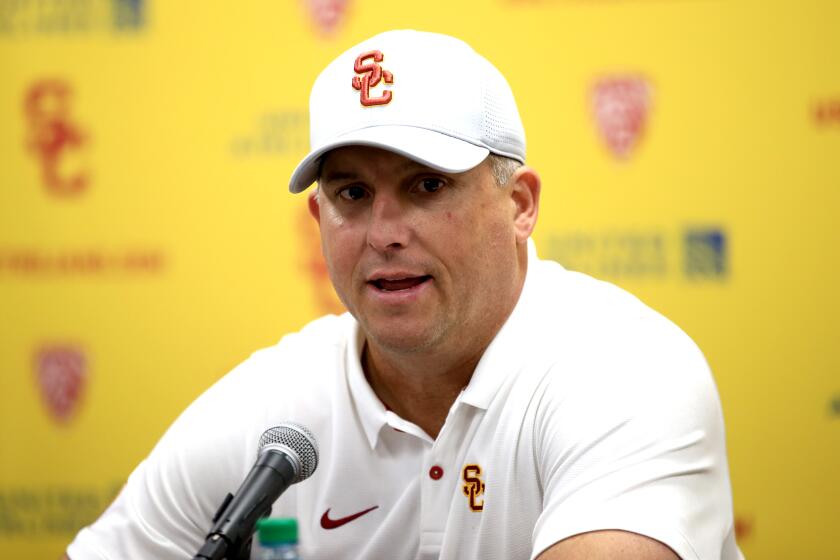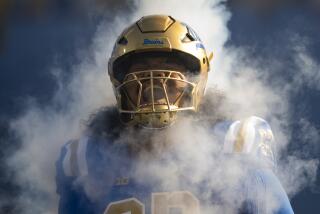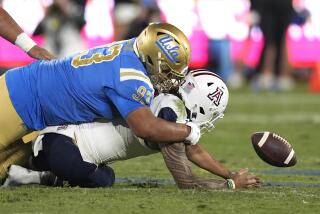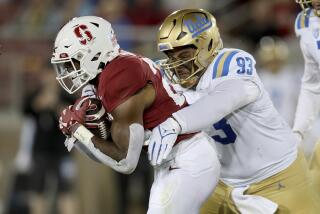Tayler Katoa on a mission to help USC after two years of wondering
- Share via
The updates were sporadic. Every week or so, Tayler Katoa would receive a message from his father, relaying scores, stories, stats, whatever, about the team he’d left behind.
For two years, as Katoa served his Mormon mission in cities across Virginia, severing most ties to his previous life, the updates were his only remaining connections to USC football. The closer he drew to the end of that timeline, the more he missed football, the more anxious he became.
Through the entirety of his mission, the former Trojans linebacker didn’t watch games or catch highlights. He didn’t use social media or frequent message boards. But his limited window into college football was wide enough at least to compound concerns over a coach who’d once promised to save him a scholarship.
“[Clay Helton] being on the hot seat, that brought me some anxiety,” Katoa said. “If he wasn’t there, there may have to be a change of plans. He was the one in my corner through the mission. I said a lot of prayers.”
Helton ultimately kept his job — as well as his promise to Katoa. Now, with his two-year mission complete, the linebacker is all set to re-enroll at USC in late May and return to the field whenever college football emerges from its COVID-19 lockdown.
When he does, Katoa will become the first player in more than two decades to return to USC after serving such a mission. The last was Faaesea Mailo, who spent the 1997 and 1998 seasons on a mission in Japan before returning under a new USC coach, Paul Hackett, in 1999.
If Helton had been replaced, Katoa knows he may not have had the same option.
The COVID-19 pandemic has scrambled plans for college football. USC coach Clay Helton said the Trojans would need about four weeks of preparation before the start of fall camp.
He hadn’t even expected Helton to welcome him back. When he first approached the coach about his mission plans in 2018, the three-star prospect from Utah had yet to play a down, after tearing a knee ligament during spring practice as a freshman.
Katoa’s father, who once served his own mission, prepared him for the worst. Tayler expected Helton to wish him luck, and that would be that.
“I dragged my feet to his office,” Katoa said. “I told him what I was going to do and that it was a part of my faith and what I believed in.”
Helton didn’t hesitate.
“It caught me off guard,” Katoa said. “He gave me his full support.”
Still, as the Trojans struggled through a tumultuous stretch ripe with speculation, Katoa spent the next two years wondering how far that support might extend.
There was little time to dwell, though, with missionary work demanding his constant attention. Every few months, he moved to a new city, helping where he could, focusing on his faith as much as possible.
It wasn’t until last week, when Helton laid out his path back over FaceTime, that Katoa finally felt assured of his return.
Because of NCAA rules, Helton is unable to comment on Katoa until that comeback is official.
Abdul-Malik and Munir McClain, who play football at USC, are living a new normal during the pandemic. It’s virtual classrooms and virtual lessons from coaches.
“When I decided to leave it behind for a few years, I realized how much football meant to me,” Katoa said. “It just made me want to work harder when I got home. It gave me a new fresh perspective on what I have and how I can be better.”
When Katoa will return to a football field is up in the air. With college football shut down for the foreseeable future by the novel coronavirus, Katoa remains quarantined at home in Layton, Utah, with his six siblings — one of whomis a personal trainer with private access to a gym.
After two years spent with no access to weights and only 30 minutes to work out every morning, his quarantine conditions represent a major improvement in that regard.
He’ll have to wait another six weeks to officially be able to join meetings, access film and talk to his position coaches. After that, there’s no telling how long the lockdown of college football will continue. But after one year spent injured and two more on a mission, Katoa is just happy to have his opportunity. Whenever it may finally come.
“I never thought I would come back to this situation, obviously,” Katoa said. “But like everyone else, I’m making the best of it.”
More to Read
Go beyond the scoreboard
Get the latest on L.A.'s teams in the daily Sports Report newsletter.
You may occasionally receive promotional content from the Los Angeles Times.








